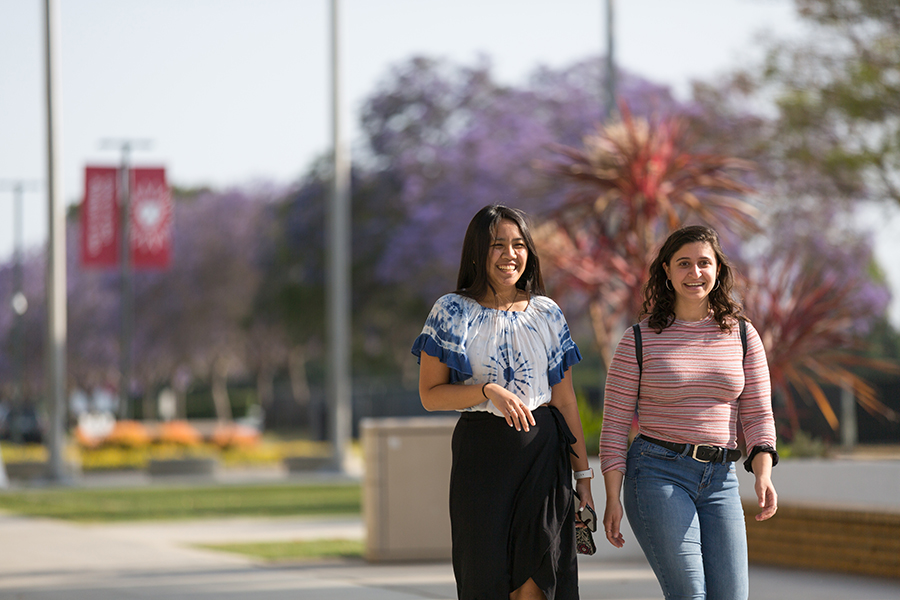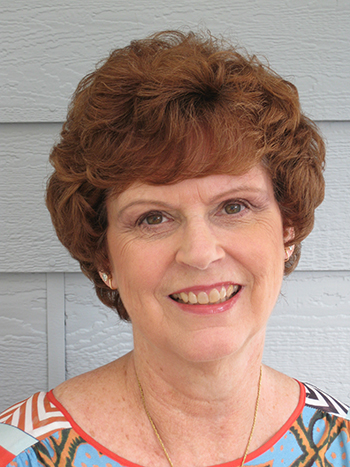
When Marilyn (Whittouck) Heron ’66 was an undergraduate at Marymount College, she remembers thinking that she had been granted the best ocean view in Southern California. Those were the days before the 1973 merger with Loyola University, establishing what we now know as Loyola Marymount University. Guided by the sisters of the Religious of the Sacred Heart of Mary, the young women of the college pursued their studies at the former Marymount campus on the Palos Verdes Peninsula.
“The nuns were highly educated, and we always had excellent faculty members. The environment was very supportive – most of us lived on campus, and that allowed me to form lifelong connections,” said Heron. “I was among the first three students to major in mathematics, and I helped to establish an intercollegiate math group with Loyola University.” On visiting the university’s Westchester campus, she remembers the amusing awkwardness of the male students. “We would be approaching a building on campus, and the young men weren’t quite sure whether they should hold the doors open for us – we used to find that very entertaining. At Marymount College, we were responsible for opening our own doors and taking care of ourselves.”

As it happens, one of those Loyola students became Marilyn’s husband – Robert Heron ’64, whom she met at a fraternity party. After graduating, the couple started a tradition of consistent annual giving to their alma mater, and Marilyn Heron has established two important bequests since her husband’s passing. Her first bequest reflects her own academic interests, with the intent of establishing a scholarship for students majoring in mathematics and data science in the LMU Frank R. Seaver College of Science and Engineering; the second in the memory of her husband, creating a scholarship for students studying business analytics in the LMU College of Business Administration. Together, the scholarships bring Heron’s lifetime giving to more than $1 million, recognizing her as a member of the LMU Centennial Society.
Heron has also made gifts to LMU initiatives that are of particular personal interest, such as her support for a course about conservation of the university’s collection of liturgical vestments, led by Leon Wiebers, associate professor of costume design in the LMU College of Communication and Fine Arts. Her diverse and personalized approach to giving demonstrates her wide-ranging involvement across the arts, business, and the sciences, and her generosity to LMU has allowed her to express her values and instinctive curiosity. “I received a scholarship to Marymount College, and that shaped what I was able to do and who I became,” she said. “I think it’s only right to pay it forward.”
When Heron embarked on her studies, she initially intended to become a high school math teacher. “I had to rethink my career path because the state of California changed the requirements for teachers,” she explained. “Then, I saw in the Loyola newspaper that two aerospace companies would be holding interviews on the Loyola Westchester campus – I ended up receiving offers from both of them.” At that time, aerospace was still an emerging industry; for Heron, the new role appeared to be “just another place to use my skills.” Soon, however, she was working for North American Rockwell, where she participated in the launch of the Apollo spacecraft and produced a section of a book about mathematical techniques for NASA. Another highlight of her career was working at Jet Propulsion Laboratory, where she collaborated on the Voyager mission that gathered data while traveling around Mars, Jupiter, Saturn, and Uranus.
“I’m very proud of the projects that I worked on,” she says. “I appreciate the opportunity of being involved in endeavors that exemplify some of humankind’s finer moments.” Her working environment, however, was not free from misogyny. “You would encounter it in the types of tasks that were considered ‘women’s work,’ or maybe you didn’t get the promotion you deserved, or maybe your job was one of the first to go if the company was experiencing economic difficulties,” she said. “However, toward the end of my career there were many women working in my field, and the male-dominated culture of the aerospace industry was rapidly changing.”
Perseverance was one of the primary qualities Heron cultivated during her time at Marymount College. Being among the first students to study mathematics meant that she didn’t have the same foundation of peer support, but she was equipped with the temperament to be a self-starter. As a former scholarship recipient, she knows the transformative possibilities of receiving financial backing – the stabilizing foundation that allows students to discover their personal strengths for themselves. “If I can help, even just in a small way, it can allow students to stay motivated and continue their education,” she said. For Heron, her education was not only the starting point for an extraordinary career. It provided her with her characteristic attitude of interest and engagement – whether in scientific progress, creative exploration, or the lives and inherent potential of other human beings.
To learn more about leaving a bequest to LMU, contact Carí Jackson Lewis, J.D., LL.M., ’17, executive director of development for gift planning, at 310.338.2920, cari.lewis@lmu.edu. You may also wish to visit the LMU gift planning giving website, and you can give to student scholarships here.



